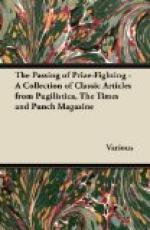* * * * *
The Cinderella Man (HODDER AND STOUGHTON), “a romance of youth,” by HELEN and EDWARD CARPENTER, is more suited to the ingenuous than the sophisticated reader. Its hero is a poet, Tony Quintard, very poor and deathly proud. The scene is set in New York and largely in Tony’s attic verse-laboratory, which Marjorie, the rugged millionaire’s daughter, visits by way of the leads in a perfectly proper if unconventional mood. The idiom occasionally soars into realms even higher. Thus when Tony’s father dies he is “summoned, by the Great Usher of Eternity.” When the gentle Marjorie, reading out one of Tony’s efforts—
“Love whose feet are shod with light
Lost this ribbon in her flight;
Rosette of the twilight sky,
Waft to me Love’s lullaby!”
(the note of exclamation is Tony’s), says, “Anyone who can write songs like that ought to write an opera,” you realise that her heart is sounder than her pretty head. Anyway Tony, who needed no encouragement, wrote his opera and landed a ten-thousand dollar prize for same, together with the daughter of the millionaire, who began to see, no doubt, that there might be something in poetry after all.
* * * * *
Indian Studies (HUTCHINSON) one may call a work partly descriptive and historical, partly also polemic. Its author, General Sir O’MOORE CARAGH, V.C. (and so many other letters of honour that there is hardly room for them on the title page), writes with the powerful authority of forty years’ Indian service, five of them as Commander-in-Chief. His book is, in compressed form, a survey of the Indian Empire that deserves the epithet “exhaustive”; history, races, religious castes and forms of local government are all intimately surveyed; the chapters on the India Office and (especially) the army in India will command wide attention both among experts and the general public. Naturally the word “experts” brings me to the controversial side of the subject, the much discussed Montagu-Chelmsford Report, concerning which the late C.-in-C. holds views that might fairly be described as pronounced. Where authorities differ the honest reviewer can but record impartially.




